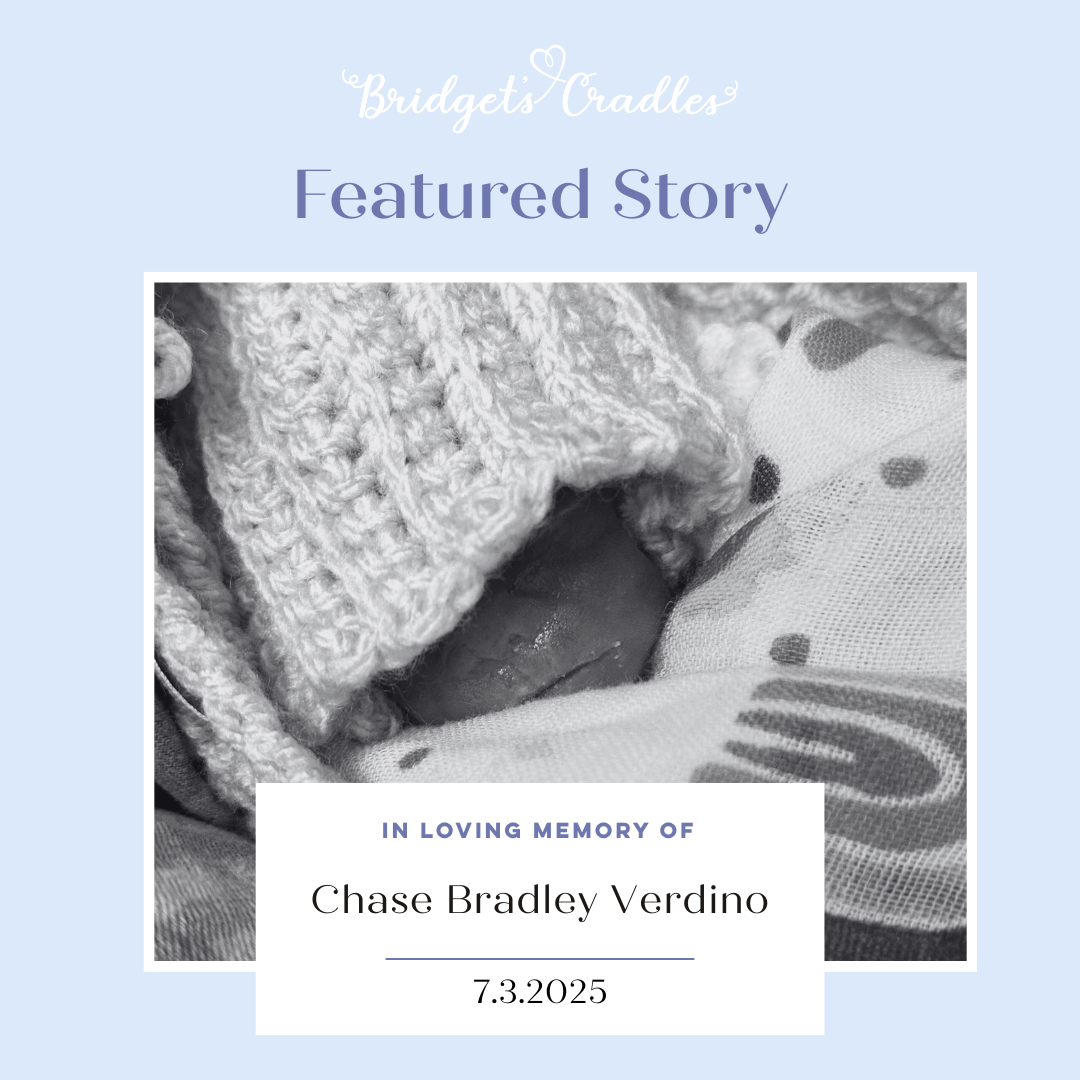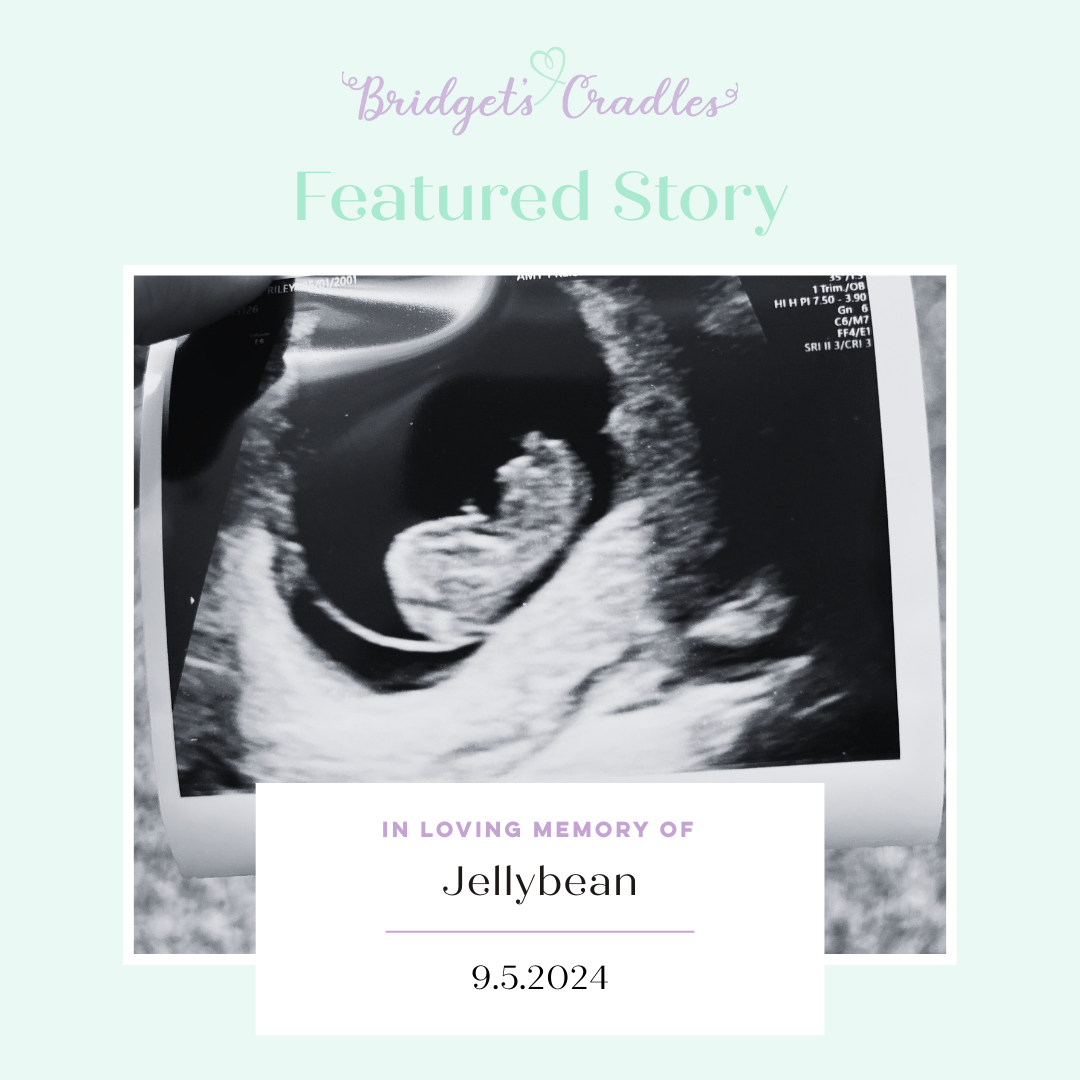Wave of Light | October 15, 2025 Register Now
registration open!
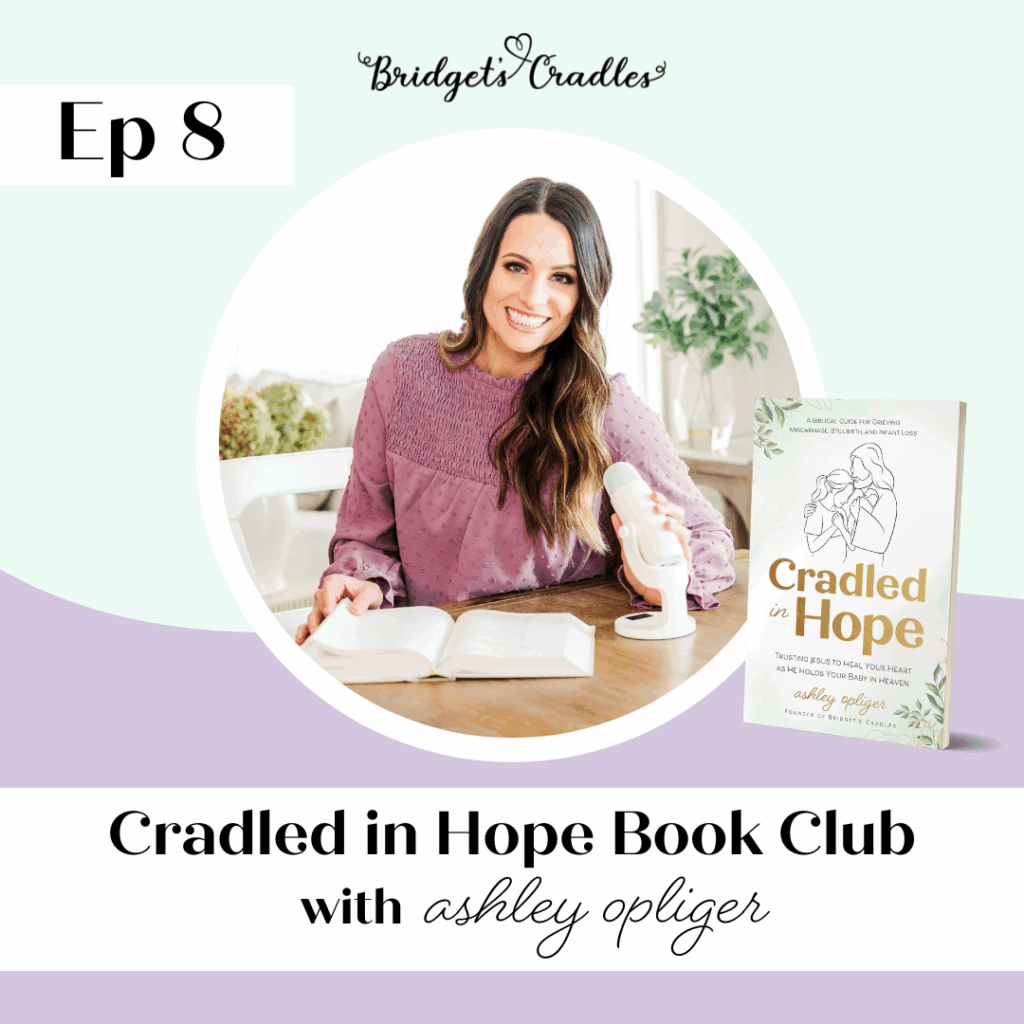
In this episode, Ashley walks alongside grieving moms who are struggling with guilt, shame, or regret after the loss of their baby. Centered on Chapter 7 of Cradled in Hope, “Grace Upon Grace: When You Can’t Forgive Yourself,” she offers compassionate truth for the mom who wonders if she could have or should have done something differently. With tender honesty and biblical reassurance, Ashley shares how grace—not guilt—is the way forward.
Ashley shares her personal struggle with shame and how she once believed her body had failed her daughter. With real-life stories, scriptural encouragement, and an invitation to rest in the finished work of the cross, this episode helps grieving moms understand that self-forgiveness is possible through Christ—and that His mercy is more than enough.
In this episode, Ashley shared:
- Why grieving moms often struggle with shame and regret after loss
- Her personal battle with body resentment after Bridget’s stillbirth
- The impact of living in broken bodies in a broken world—and how that shapes our perspective
- The difference between hindsight and control, and how we can’t hold ourselves accountable for things we didn’t know
- Why we need to extend the same compassion to ourselves that we would give to a friend
- What it means to forgive our bodies, our decisions, and our broken expectations through the lens of grace
- A biblical understanding of how our babies were knit together body, soul, and spirit
- The eternal hope we have because our babies are alive in Heaven
Ashley reminds us that our bodies were never meant to carry the blame. They were created by God, designed to be temples for His Spirit—and through Christ, we are forgiven and free. Our babies were miraculously knit together, and even if their lives were brief on earth, they are eternal in Heaven. There is no condemnation in Christ—only grace upon grace.
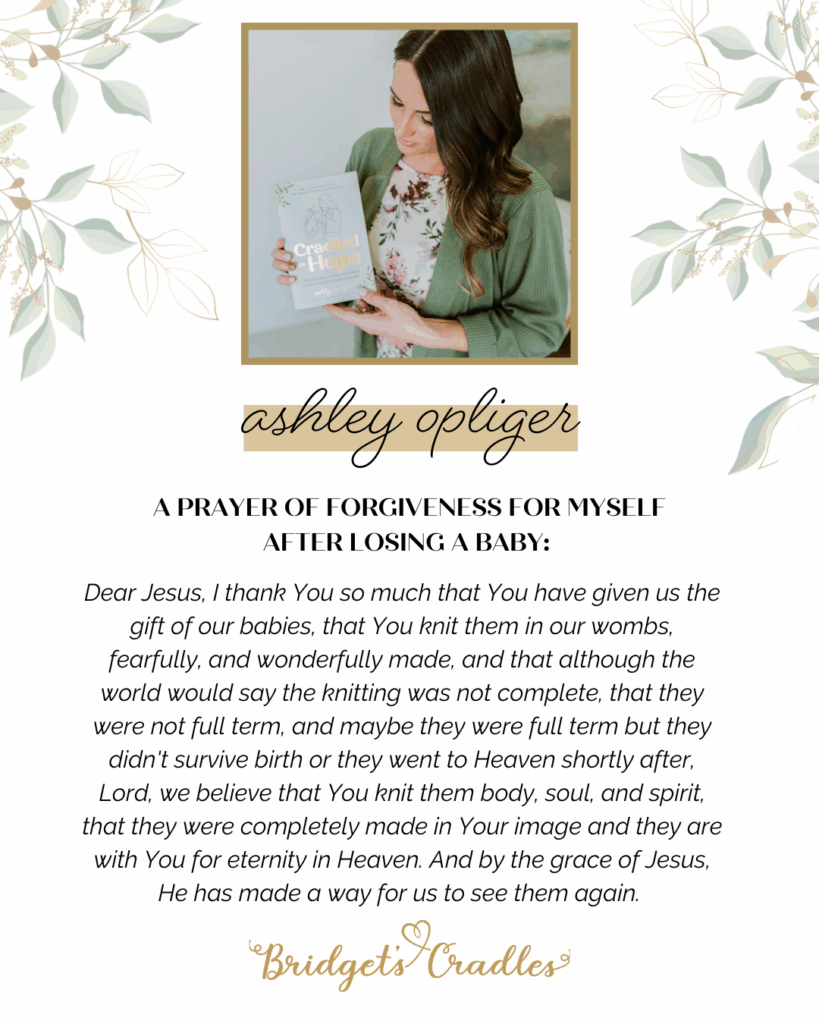
Journaling Prompt
Ask Jesus to help you forgive your body and see it for what it is: a sacred temple that houses His Spirit and grew your precious baby. Write a prayer of gratitude for your body and the blessing of your baby.
Healing Step
Know that you are a good mom. You didn’t cause your baby to die. Write a letter of forgiveness to yourself. Offer yourself the same grace and compassion you would show a friend. At the bottom of your letter, write out Romans 8:1—“There is therefore now no condemnation for those who are in Christ Jesus.”
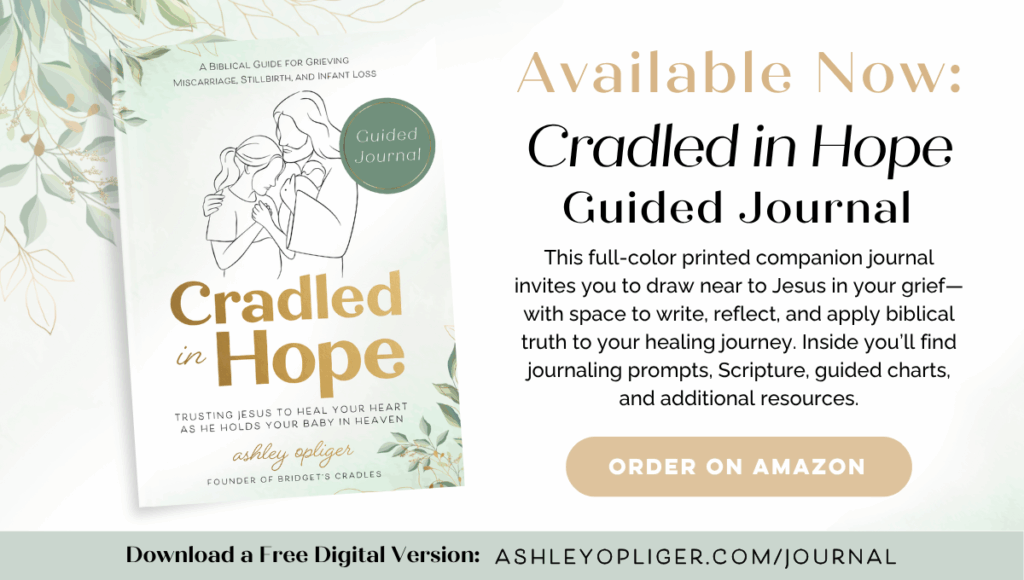
Full transcript below.

New episodes will be shared on the 1st of every month. Don’t miss a single episode…subscribe wherever you podcast!
Please also leave a review to help spread the message of hope with other grieving mommas!

MEET OUR HOST
Ashley Opliger is the Executive Director of Bridget’s Cradles, a nonprofit organization based in Wichita, Kansas that donates cradles to over 1,600 hospitals in all 50 states and comforts over 30,000 bereaved families a year.
Ashley is married to Matt and they have three children: Bridget (in Heaven), and two sons. She is a follower of Christ who desires to share the hope of Heaven with families grieving the loss of a baby.
Connect with Ashley:
Facebook /ashleyopliger
Instagram @ashleyopliger
Pinterest /ashleyopliger
www.ashleyopliger.com
Follow Bridget’s Cradles:
Facebook /bridgetscradles
Instagram @bridgetscradles
Pinterest /bridgetscradles
www.bridgetscradles.com
JOIN OUR FACEBOOK GROUP FOR GRIEVING MOMS
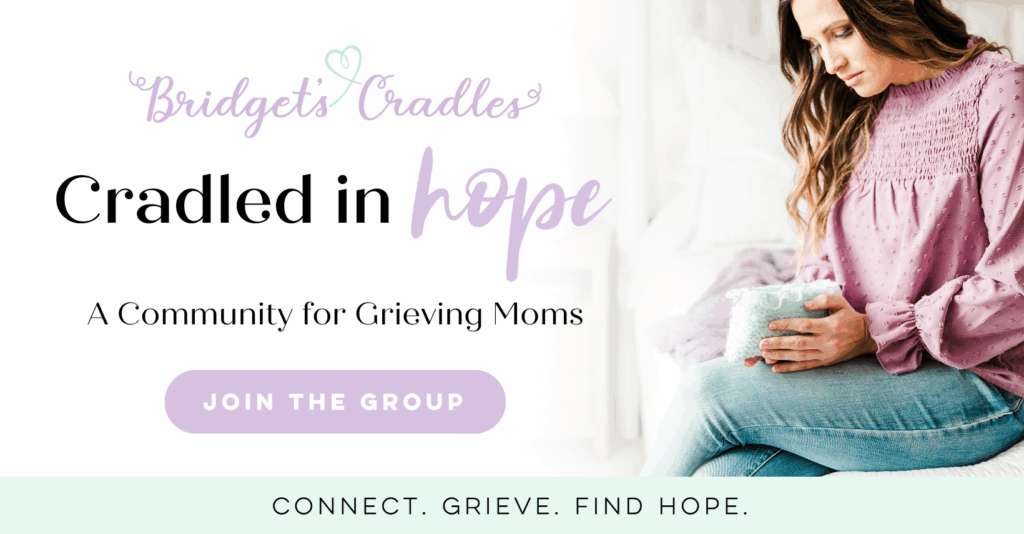
EPISODE TRANSCRIPT
Ashley Opliger: [00:00:00] Welcome to the Cradled in Hope Podcast Book Club.
I’m your host, Ashley Opliger—grieving mom, author of Cradled in Hope, and founder of Bridget’s Cradles. I’m so honored to walk with you through my book, one chapter at a time, as we navigate the heartbreak of losing a baby together.
After my daughter Bridget went to Heaven at 24 weeks, I wrestled with deep sadness and complex questions about God’s goodness. But through that grief, Jesus showed me that He not only cradles our babies in Heaven, He also holds our broken hearts here on earth.
Whether you’re reading along or simply listening in, this is a safe space for your sorrow—a place where your tears, questions, and raw emotions are welcome. Each episode, we’ll reflect on a chapter of Cradled in Hope and gently walk together from heartbreak to healing, and from pain to purpose.
My prayer is that this podcast will remind you that you are not alone in your grief and, most importantly, that it will point you to Jesus, the only One who can truly heal your heart. Through faith in Him, there is hope to see your baby again, and He will be with you every step from here to Heaven.
So wherever you are in your journey, I invite you to join me—and together, we will grieve with hope.
Let’s begin.
Ashley Opliger: [00:01:22] Hi friends. Welcome back. Today we are diving into Chapter Seven, Grace Upon Grace: When You Can’t Forgive Yourself.
[00:01:31] This chapter really focuses on the fact that, oftentimes, grieving moms blame themselves for the loss of their baby. They feel as though their body failed their baby, and sometimes that makes them feel as though they’ve failed as a mother.
I know I experienced those feelings, and I’ll talk a lot about that in this episode, but also, there are so many different things that you may regret about your pregnancy, things that you wish you had done differently.
[00:01:56] Maybe it’s about your baby’s birth or it’s about what you chose after their birth and death, the decisions that you made regarding a memorial service or what you chose to do with their remains, whether that was a burial or cremation. There were a lot of decisions that had to be made in the midst of an incredibly traumatic, heartbreaking time.
[00:02:16] And I’ve talked to so many grieving moms who have experienced regret and shame over the decisions they made or did not make. And so this chapter really focuses on giving yourself grace in the midst of that.
[00:02:28] I want to start by reading the key passage from the chapter, which is Romans 8:1, “There is therefore now no condemnation for those who are in Christ Jesus.”
And that’s going to be our anchor verse because, as grieving moms, the enemy wants to use the loss of our baby to instill shame and self-blame into our lives and use that to distort our identity in Christ.
And I know for me, the enemy really manipulated and used a lot of different lies to try to blame me for the loss of Bridget, to tell me, “If you would’ve known this or you would’ve done this differently, you could have changed the outcome.”
[00:03:09] And it’s so important for us to know that there are simply things that are outside of our control, that in this broken world and in our broken bodies, there are things that we cannot control, and there are things that we don’t know and we wouldn’t have known.
And in this chapter, I share a little more about Bridget’s birth story and going into labor, and what that looked like. But when I came home from the hospital with empty arms and an empty womb, I remember every time I would undress to get in the shower, and I would see my naked frame in the mirror, I would be filled with so much shame, and I really hated my body for what it did. I blamed my body.
I had all of these questions. “Why wasn’t my body a safe place for her to be full term and healthy and delivered safely into this world?” I had all of these feelings of, “Why was I not good enough? I honestly felt like I was a failure and that my body failed my daughter. And so throughout this book, I really talk a lot about the fact that we’re living in this timeframe of ‘already, but not yet’.
[00:04:12] And I have a diagram on page 124, and it has the general order of events starting with Creation, the Fall, Jesus’ birth, and then His death and resurrection. And then eventually there will be a Resurrection and Second Coming, and then on into eternity. And so I explained that we are somewhere in between Jesus’ first coming and His second, and it’s important to know that He has already defeated death at the cross, but we have not yet been resurrected.
[00:04:41] And so there has been redemption, but not yet restoration. And I mention that because although we have this hope and we know that death has been defeated, we are not yet in our glorified bodies. So we are living in very broken bodies that are corrupted by sin and death, and all of these things that can happen during a pregnancy.
[00:05:06] Diseases, infections, disorders, disabilities, random accidents that can happen, cord accidents, there are so many things that can happen and that can go wrong in the midst of a pregnancy. And the further that I’ve walked this journey with grieving moms, the more and more different stories that I’ve heard and the different ways that things can go wrong.
[00:05:25] And it’s a sad reality of living in a broken body, but it’s also a reminder that there are things that we cannot control. We can’t fix these things. And so that should hopefully allow us to have grace to understand that we are good moms, that if we could have saved our baby, we would have.
And that’s what I tell moms all the time, is, “You are a good mom. If you could have saved your baby, you would have. I know you would have, because even just the fact that you’re ruminating over all the things that you think you could have done differently tells me that you’re a good mom, that you wanted to do everything possible for your baby.”
[00:06:02] And I know that about myself. I know that if there was something that I could have done, I would’ve fixed it. I would’ve done anything for Bridget. And the truth of the matter was, I experienced a subchorionic hemorrhage and all I could do was lay on bed rest. And I did that for her, but it still wasn’t enough.
[00:06:20] And that doesn’t mean that I failed her or that I didn’t love her, or that I wasn’t a good mom. It means that the brokenness in the world that was existing in my body, that was outside of my control, happened. And I eventually had to take and have rest in that.
[00:06:36] And so oftentimes, I think the enemy wants us to feel as though we are failures as a mom. He wants to blur this line between our identity as a mom and what happened inside our bodies.
And something that happened for me was after Bridget went to Heaven, I went to all these doctors, and I was trying to search for answers of why this happened. And would this happen again? What was wrong with my body?
[00:07:00] Throughout that process, I was diagnosed with an autoimmune disease, a thyroid disorder, and the Polycystic Ovarian Syndrome that I had known that I had before pregnancy was confirmed as a factor that led to issues with low progesterone, which caused issues with my uterine lining not being thick enough, which most likely played a factor in the subchorionic hemorrhage.
[00:07:23] And so I did try to trace it back and figure out what happened. And honestly, I may never know exactly why this happened, but I did find out that I had some health issues.
And so later on, when Matt and I were trying again, we experienced infertility when we were trying to conceive both of our boys, but we eventually were able to get pregnant again, and we have these two little boys, they’re eight and four now, but in each of their pregnancies, I was on progesterone from the time I found out I was pregnant all the way through the pregnancy. I was on suppositories and injections, I was on thyroid medication, and I changed my diet. There were all these different things that I did, and both of them were full-term and healthy.
[00:08:04] And so naturally I think to myself, “If I would’ve done all of those things in Bridget’s pregnancy, maybe she would be here. Maybe the subchorionic hemorrhage wouldn’t have happened, and the placental abruption wouldn’t have happened.” But what I have to tell myself is that I didn’t know those things at that time.
[00:08:21] So much of this is hindsight, that as you progress and you learn new things and you get tests done and labs and everything, you find out more. And maybe you don’t have an answer, and that’s very possible that for many of you that are listening. You may not have an answer.
[00:08:36] And I understand that that can be very difficult too, to be told, “We don’t understand why your miscarriage happened. We don’t understand why your baby was stillborn,” and you don’t have answers. And that’s very hard. But I would argue that it’s also sometimes hard to have the answers because even if you have the answers, there’s nothing you can do to go back and change it.
[00:08:56] And so I look back and I think, “I didn’t know those things, and so why am I blaming myself for having knowledge that I have now, not having it then?” Because the only reason I have that knowledge now is because that happened.
A mom who is pregnant for the first time, like I was with Bridget, she wouldn’t think to go and be on thyroid medication and to go and be on progesterone suppositories. Not only would she not think that, but her doctor would not advise that because there’d be no reason to do that.
[00:09:24] And so again, I have to remind myself I didn’t know what I didn’t know, and I need to not blame myself for not knowing everything, because ultimately I am not God. I don’t know the future, and I cannot change the past.
[00:09:38] And that’s something that’s really hard for me to grapple with sometimes, is I want to control things. I want to be able to fix things that are not right. And sometimes we can’t, and that’s part of our capacity and our experience of being a human in a very broken world.
[00:09:51] I really realized that I needed to surrender my control. I needed to surrender my children’s lives. Not just Bridget’s life, because I did have to surrender her and say, “Okay, Lord, You have her in Heaven and I trust Your plan for her life,” but later on, when I had my two boys, I had to trust Him with them during the pregnancies and then even beyond then.
[00:10:12] Every single day as a parent, you have to surrender your children, and say, “I’m not guaranteed tomorrow for any of my children. I’m not guaranteed tomorrow for my own life. And Lord, I’m going to trust You that You have a good plan and You’ll number their days in Your sovereignty, and I can trust in Your plan.” And that is a really hard place to be.
[00:10:32] But I had to eventually decide when I was trying again, was I had to say, “You know what, God, I’m not going to try again until my faith is greater than my fear, because I don’t want to live in fear over this happening again.”
[00:10:46] And when I say that, it didn’t mean that I didn’t have anxiety, that I wasn’t worried, that I didn’t take special precautions. Of course I did. That’s using godly wisdom and conviction. But I did not want it to take away all joy of having another baby and going through another pregnancy.
And so it took me two years before I was ready to try again because I had so much fear of, “Is this going to happen again? Will my body be able to sustain a healthy pregnancy?”
[00:11:14] And when we started trying again, I didn’t know the answers to that. I had to trust. And I hope that’s an encouragement for you today.
Ashley Opliger: [00:11:22] We hope you’re finding encouragement in this episode so far. We want to take a moment to share some resources our ministry offers to support grieving moms like you.
On our website, bridgetscradles.com, you’ll learn more about our nonprofit and find many hope-filled resources, including free e-books to help you plan a memorial or funeral service for your baby, meaningful ways to honor your baby in your heart and home, and gentle guidance for navigating difficult days like due dates, Heaven Days, and holidays.
We invite you to join our community of grieving moms through our Christ-centered support groups, offered both in-person at our headquarters near Wichita, Kansas, and virtually through Hope Online. These gatherings provide a place to find comfort, connection, and biblical hope alongside other moms who understand your pain.
You can view upcoming dates and sign up on our website. While you’re there, we’d also be honored for you to share your baby’s story with us.
For ongoing support, we welcome you to join our private Cradled in Hope Facebook group—a safe space for grieving moms to find friendship and walk their healing journey together.
To stay connected with us and receive faith-filled encouragement, follow us on Facebook and Instagram at @bridgetscradles, @cradledinhope, and my personal page @ashleyopliger.
Now, let’s get back to the episode.
Ashley Opliger: [00:12:41] But I also want to speak to any mom that’s listening who is struggling with forgiving yourself for decisions that you made, maybe that you’re not struggling with body resentment like I just told you, but maybe there’s some sort of decision that you made that is really hard for you to sit with.
Here are some examples that I’ve talked to many grieving moms, and I’ve heard them share their own stories, but one of the things that I hear often is that they wish that they would’ve taken pictures of their baby.
[00:13:07] They didn’t get pictures at the time of their birth, that they didn’t have the living siblings come up to the hospital because they felt like that was going to be too hard for them. Maybe they didn’t have a cradle or a blanket for their baby or an outfit because they found out there was no heartbeat, and they went straight to the hospital, and so there was no time to prepare.
[00:13:25] Maybe you chose hospital disposition for your baby’s remains, and you didn’t know that you could have a private funeral, or you chose cremation and you wish now that you would’ve had a burial or vice versa. There are so many different decisions that you had to make in the midst of a time that you were physically and emotionally exhausted and in shock and trauma, and it’s so hard to make these big, life-changing decisions when you’re in the midst of such grief.
[00:13:53] And so the thing that I always say to people when you’re struggling with wishing you would’ve done things differently, for me, we did have pictures taken of Bridget, but we did not take any video on the day of her birth. And I look back and I think to myself, “I really wish I would’ve had video of her and of us holding her, of us, of our family members holding her.” But I did not think to take out my phone and take videos.
[00:14:16] We did have a Now I Lay Me Down to Sleep photographer come, and those pictures are our most prized possession. But we just didn’t think to take video and sometimes I’ll beat myself up and think, “Well, you missed that opportunity. You’ll never get that opportunity again. You had 24 hours with her and that was the only time that you could have done that.”
And so the advice that I give in my book is that I want you to imagine yourself hearing your story come out of the mouth of a friend or a family member that’s sharing that with you. And I want you to imagine what you would say to her.
And I guarantee you, you would have a gentleness and a love and a compassion and a grace for her, and you would see what she was walking through, and you would have so much grace for her.
[00:15:08] For example, if a grieving mom in a support group came up to me and said, “I didn’t get any videos of my baby at the time of their birth,” and they felt so much shame over that, my response would be, “Of course, you didn’t think of it. You were going through such grief and shock and trauma, and this was the worst day of your life, and there were so many decisions to be made, and you were doing the best that you could do in the midst of such grief and sadness. And I’m so sorry that you don’t have those videos, but you are a good mom. You love your baby so much.”
And I would say things like that because that’s truly how I would feel for her, the compassion and empathy that I would have for her. Yet oftentimes we don’t extend that same grace and compassion to ourselves.
[00:15:53] And so I would encourage you, if you’re having a difficult time forgiving yourself for something, to imagine someone else saying it to you, and then envision what you would say back, and if you can, try to say that to yourself and extend that same grace to yourself.
[00:16:12] And so I’m now going to transition to the second part of this chapter, which is really talking about how God knits us together in our mother’s womb, that He makes us three parts.
Just as God Himself is tripartite, which means He is made of three parts: Father, Son, and the Holy Spirit, He has made humans in three parts. So we have a body, a soul, and a spirit. And I have a diagram and a chart on page 129. I would encourage you to go read that and look at it, explaining the difference between a body, a soul, and a spirit, and how God has made humans in this very unique way.
[00:16:46] This is what sets us apart from animals, birds, and fish, is that we are made in His image, and we have a soul and a spirit. And so I talk about how, first of all, that He’s made our bodies to be a temple to house His Holy Spirit, and so our bodies are sacred.
[00:17:09] And so I try to explain this in the book that not only should we have grace for our bodies, but we should see them as they are, which is a temple of God, that the enemy wants us to hate our bodies and blame them.
If we have the right view of our body, that our body was given by God as a covering of our soul and our spirit, and that He has given that as a dwelling and a tent for our soul to live in because we live in a physical place called earth. And He has made us that way very intentionally, and likewise, He’s made our babies that way.
[00:17:42] And so when I hear Psalm 139 and it talks about how God has created our inmost being and knit us together in our mothers’ wombs, and I think about our babies being knit in our wombs, I think we assume that if we have a miscarriage or a stillbirth, because they were born earlier than they should have been, that the knitting was incomplete because their body was not full term.
[00:18:09] And I want you to read this chapter because I share a lot of the Hebrew and the Greek words in the Bible and their meaning, and I really analyze all of this. But essentially what I’m saying is that I believe the knitting of our babies was complete because at the moment of conception, He is knitting a soul and a spirit in this little body. And even if you miscarried at eight weeks, their spirit and their soul that was made in the image of God was knit together.
[00:18:42] And why am I sharing this in the book? Because that gives us so much hope that the spirit that we’re given is an eternal spirit, and that that means that when they died, that they will live forever in Heaven.
[00:18:58] And we talked about in a previous chapter about why I believe babies go to Heaven. And you can go back to that episode and go back and read that chapter. It’s Heaven on Earth. But as the Creator miraculously united your DNA and your husband’s DNA together, He also breathed life into this little baby in their human spirit.
[00:19:20] And that spiritual part of us is the part that never dies. In fact, Paul said that we are made up of more than just a body when he said, “If there is a natural body, there is also a spiritual body.” And throughout this chapter, I give a lot of different Scripture references to explain these different parts of our body and why it’s so important to understand how we are created in our womb, that we are more than organs and bones and tissues and veins and vessels. We are made up of a soul and a spirit that was made in the image of God and our babies were.
And that gives me such hope to know that that knitting was complete, even though her life was shorter than I wanted and expected, that her spirit is secure for eternity because of the grace of God. And I’m so, so grateful for Jesus and His sacrifice.
[00:20:12] And so this means that no matter how many weeks you were when you lost your baby, that that time was not lost or wasted, that those weeks that you were growing your baby, no matter how brief, they have afforded you an eternity in Heaven with them. We have not lost our babies.
And so I just want to encourage you today that as you look at your pregnancy and your baby’s birth and their death, and the decisions that you made, that you would extend yourself grace, that you would have a good understanding of how your baby was created inside your womb, and that you have the high and privileged honor to be their mom, and that God gave you this body to be a temple to house His Spirit and to follow Him and to proclaim His Name.
[00:20:58] And He has given us such great hope to see our babies again. He gifted our babies to us, and He has made a way for us to spend eternity with them. And because they’re eternal beings, we will see them one day. So I pray that that brings you comfort.
[00:21:11] I want to now close with our journal prompt and healing action. The journal prompt is that I want you to ask Jesus to help you forgive your body and see it for what it is, a sacred temple that houses His Spirit and grew your precious baby. Write a prayer of gratitude for your body and the blessing of your baby.
[00:21:30] And then the Healing Step is that I want you to know that you are a good mom. You didn’t cause your baby to die. Write a letter of forgiveness to yourself. Offer yourself the same grace and compassion you would show a friend. At the bottom of your letter, write out Romans 8:1, which was our opening passage from this episode.
[00:21:51] Let me close us in prayer.
Dear Jesus, I thank You so much that You have given us the gift of our babies, that You knit them in our wombs, fearfully, and wonderfully made, and that although the world would say the knitting was not complete, that they were not full term, and maybe they were full term but they didn’t survive birth or they went to Heaven shortly after, Lord, we believe that You knit them body, soul, and spirit, that they were completely made in Your image and they are with You for eternity in Heaven. And by the grace of Jesus, He has made a way for us to see them again.
And so, Lord, I pray that His grace and mercy would cover us, that we would forgive ourselves and our bodies for what happened in our miscarriage or stillbirth or loss, that You would deny the enemy his lies, that we would not blame ourselves or feel that we are failures as moms, that You would show us that we are good and loving moms that would’ve done anything to save our babies, and that we would surrender our control and our babies’ lives over to You, trusting that You are good and sovereign over it all.
We love You, Lord Jesus. We thank You for the hope of eternity. It’s in Your Name we pray. Amen.
[00:23:04] Be sure to tune in for the next episode, which will cover Chapter Eight. They Know Not What They Do: When You Are Hurt By Others.
Ashley Opliger: [00:23:14] Thank you for joining me for today’s episode of the Cradled in Hope Podcast Book Club.
New episodes covering each chapter of the book will release on the 1st, 15th, and 22nd of each month through the end of the year—so be sure to subscribe and follow along.
If you don’t have your copy of Cradled in Hope, you can find it wherever books are sold. It’s a biblical guide for grieving moms after miscarriage, stillbirth, or infant loss—filled with vulnerable emotion, biblical wisdom, practical guidance, and hope-filled encouragement.
To accompany the book, I’ve also created the Cradled in Hope Guided Journal—a beautiful companion that includes space to write your responses to the discussion questions, full Scripture passages from each chapter, and additional reflection pages and guided charts to help you process your grief and draw you closer to Jesus. You can download the free digital version on my author website at AshleyOpliger.com/Journal, or order the printed version on Amazon if you prefer to write by hand.
Until next time, know that you are not alone. You are seen, loved, and Cradled in Hope.
I have a fancy professional bio here, but what is most important for you to know is that my first and only daughter, Bridget, went to Heaven and Jesus was the only One who could put the shattered pieces of my heart back together. Maybe your heart is broken too?
If so, I'm here to be your friend and walk with you on your grief journey. More importantly, I'm here to point you to Jesus, the only One who can heal your heart and promise you eternity with your baby in Heaven. Hold my hand, friend, and let's start this journey together.
I'm a grieving mom who found comfort in Christ.
Welcome, I'm so GlaD You're Here
More Stories That May Speak to Your Heart
Additional Reads
Spotify
Apple
Ways To Listen
Hosted by Ashley Opliger, this podcast offers Christ-centered comfort to moms grieving the loss of a baby in Heaven. Each episode is rooted in Scripture and points your heart to the truth of the Gospel, the presence of Jesus, and the eternal hope of being reunited with your baby in Heaven.
Listen to Our Podcast
welcome to cradled in hope
Donate Online
Make an eternal impact. Your donation comforts grieving families with cradles, support, and the hope of Christ.
Find a Community
You don’t have to walk this road alone. Join a Christ-centered community of moms who understand your grief.
Read the Book
Discover comfort, hope, and biblical encouragement in Cradled in Hope, written by Ashley Opliger for grieving mothers after baby loss.
Christ-Centered Comfort and Guidance for Grieving Families
Honor your baby’s memory with kindness. Explore 50 thoughtful ideas—plus a free customizable RAK card to share their legacy of love.
Random ACts of Kindness in Memory of a Baby in Heaven
Find meaningful ways to honor your baby on birthdays, due dates, and holidays—offering remembrance through cherished traditions.
Honoring Your baby on Milestones and Holidays
Offer support to a grieving parent with practical ways to help and 12 heartfelt gift ideas designed to bring comfort during deep loss.
Supporting a Loved One After the loss of a baby
Navigate life after loss with gentle guidance for grieving, healing, and finding hope in the midst of heartbreak.
Grieving and Healing After the Loss of a Baby
free e-books
Grab your free copy
How To Grieve & Heal After The Loss of a Baby
Find hope in the heartbreak of pregnancy and infant loss. This guide offers practical ideas and faith-filled next steps in navigating a path forward in your grief.

